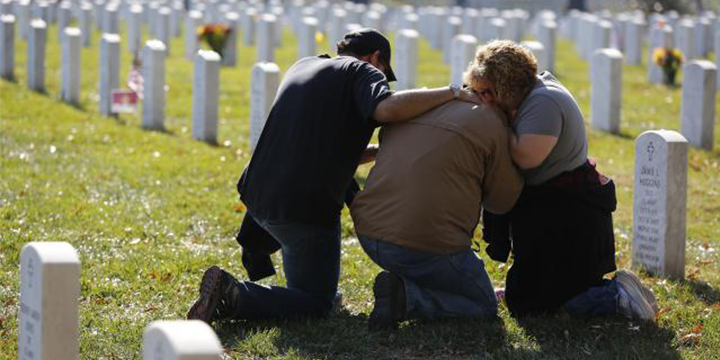The loss of a loved one can cause a major emotional crisis; it is probably the most stress-inducing experience in life. In our hearts, we all know that death is a part of life. In fact, death gives meaning to our existence because it reminds us how precious life is.
When a death occurs, we experience a wide range of emotions, even when it is expected. Many people report feeling an initial stage of numbness after first learning of a death, but there is no real order to the grieving process. Some emotions you may feel include:
- Denial
- Disbelief
- Bewilderment
- Shock
- Grief
- Yearning
- Anger
- Humiliation
- Misery
- Guilt
- Shame
These feelings are general and common reactions to loss. You may not be ready for the intensity and extent of your emotions or how swiftly your mood changes. You may even begin to doubt your mental stability. But these feelings are healthy and appropriate and will help you come to terms with your loss. It takes time to fully absorb the impact of a major loss but the pain eases in time and allows you to go on with your life.
It is not easy to cope with the death of a loved one. You will mourn and grieve. Mourning is the natural process you go through in order to accept a major loss. Mourning may include religious traditions, honouring the dead or getting together with friends and family to share the grief. Mourning is personal and may last months or years..
Grieving is the outward expression of your loss. Your grief is likely to be expressed physically, emotionally and psychologically. For instance, crying is a physical expression, while depression is a psychological expression. It is very important to allow yourself to express these feelings. Often, death is a subject that is avoided, ignored or denied. At first it may seem helpful to separate yourself from the pain, but you cannot avoid grieving forever. Someday, those feelings will need to be resolved or they may cause physical or emotional illness. Many people report physical symptoms that accompany grief. Stomach pain, loss of appetite, intestinal upsets, sleep disturbances and loss of energy are all common symptoms of acute grief. Of all the reasons for stress in life, grief can seriously test your natural defence systems. Existing illnesses may worsen or new conditions may develop.
Profound emotional reactions may occur. These reactions include anxiety attacks, chronic fatigue, depression and thoughts of suicide. An obsession with the deceased is also a common reaction to death.
Dealing with loss
The death of a loved one is always difficult. Your reactions are influenced by the circumstances of a death, particularly when it is sudden or accidental. Your reactions are also influenced by your relationship with the person that we lose to death.
A child’s death arouses an overwhelming sense of injustice — for lost potential, unfulfilled dreams and senseless suffering. Parents may feel responsible for the child’s death, no matter how irrational that may seem. Parents may also feel that they have lost a vital part of their own identity.
A spouse’s death is very traumatic. In addition to the severe emotional shock, the death may cause a potential financial crisis if the spouse was the family’s main source of income. The death may necessitate major social adjustments requiring the surviving spouse to parent alone, adjust to single life and maybe even return to work.
Elderly people may be especially vulnerable when they lose a spouse because it means losing a lifetime of shared experiences. At this time, feelings of loneliness may be compounded by the death of close friends.
A loss due to suicide can be among the most difficult losses to bear. It may leave the survivors with a tremendous burden of guilt, anger and shame. Survivors may even feel responsible for the death. Seeking counselling during the first few weeks after the suicide is particularly beneficial and advisable.
Living with grief
Coping with death is vital to your mental health. It is only natural to experience grief at the passing of a loved onw. The best thing you can do is allow yourself to grieve. There are many ways to cope effectively with pain.
- Seek out caring people. Find relatives and friends who are willing to understand your feeling of loss. Join support groups with others who have experienced similar losses.
- Express your feelings. Tell others how you are feeling; it will help you work through the grieving process.
- Take care of your health. Maintain regular contact with your family physician and be sure to eat well and get plenty of rest. Be aware of the danger of developing a dependence on medication or alcohol to deal with your grief.
- Accept that life is for the living. It takes effort to begin to live again in the present and not dwell on the past.
- Postpone major life changes. Try to hold off on making any major changes, such as moving, remarrying, changing jobs or having another child. You should give yourself time to adjust to your new life.
- Be patient. It can take months or even years to accept a major loss and your changed life.
- Seek outside help when necessary. If your grief seems like it is too much to bear, seek professional assistance to help you work through your grief. It’s a sign of strength, not weakness, to seek help.
If you need further help or advice, give us a call. TriBeCa Care is happy to be by your side. Request a callback or Call us at + 913366064208.
Email us at enquiry@newwpsite.tribecacare.com

